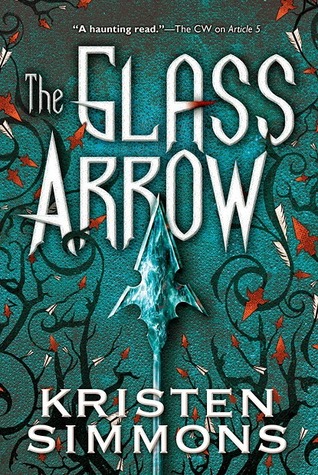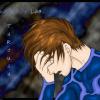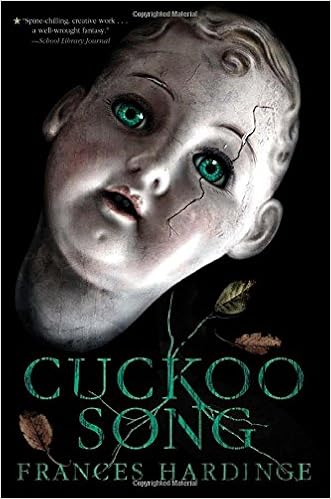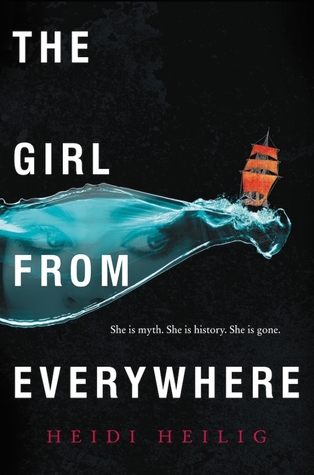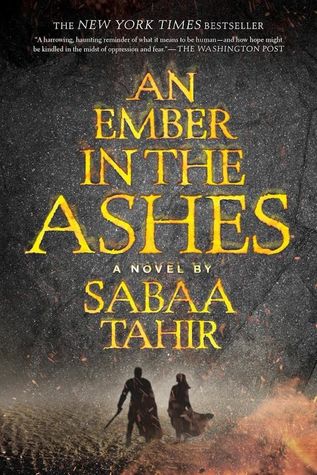I hadn't intended to dive directly into another nightmare-fuel book right after The Glass Arrow, buuuuut...well, it was just sitting there on my table, and I couldn't resist. If The Glass Arrow was a horror story for the teeny bopper crowd, A Madness So Discreet is a horror story for adults.
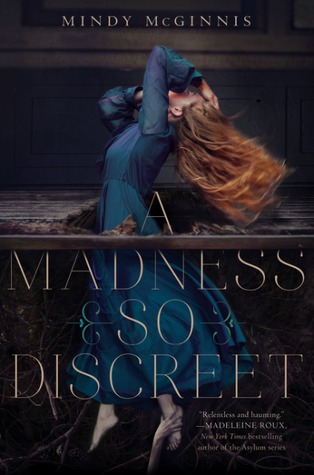
Grace Mae does not speak. Her existence is the worst kind of living nightmare: she's trapped inside an insane asylum in 1890s Boston, but she's not crazy. She was committed by her father, a U.S. Senator and disgusting serial rapist who sexually assaulted and impregnated his own teenage daughter, then locked her away to hide the crime. At the asylum, Grace is forced to endure various "treatments" - which are, to the modern eye, grossly unethical and ineffective. She's tormented by a sadistic nurse and plagued by visions of her past; Grace has a photographic memory, and for a person in her situation, it's the worst kind of curse. After she fork-stabs a visiting doctor who gets a little too handsy, she is beaten and tortured so intensely that she miscarries her baby. It's only then that she finds her voice again: she screams and fights and rages until she is thrown in the mud-soaked lower level of the asylum, which is no more than a dungeon. There, she befriends another patient - Dr. Falsteed, who was committed for trying to inoculate himself against cancer by eating it. He sits in his cell like a spider in its web, monitoring all the comings and goings of the asylum with the help of his man-on-the-inside, Reed. Dr. Falsteed finds out about her exceptional memory, and he decides to help her escape the prison.
Turns out, the basement isn't just a place where misbehaving patients are punished...it's also where the traveling surgeon Dr. Thornhollow conducts lobotomies on the most dangerous and violent offenders. Dr. Thornhollow and Dr. Falsteed are old colleagues, and although Falsteed is the one who's imprisoned, they're both a little bit crazy. Thornhollow is an experimenter on the cutting edge of medicine and criminal psychology, and he's totally got that mad scientist vibe. He's a brilliant thinker, but he doesn't understand human emotion and would probably be some kind of serial killer if not for his clear devotion to justice. He reminded me a bit of Professor Stein from Soul Eater, and he has some of the best sarcastic one-liners in the whole book. The first time Grace talks to Thornhollow, he's spattered in another patient's blood. She begs him to operate on her, to destroy the part of her brain that allows her to think and feel and remember. Dr. Falsteed interrupts and tells Thornhollow about her quick mind and photographic memory, but Thornhollow waves him off. He takes Grace into the operating room and shows her his box of scary nightmare tools, including the apple corer that he uses to destroy his patients' frontal lobes. He also questions her about her gifts, and in the end, he refuses to perform the surgery, saying that there's "a much better use" for her.
She and Thornhollow concoct a plan to fake a lobotomy - he slices up the corners of her head and wraps her in bandages, and she perfectly imitates the silent, witless mien of a lobotomized patient. The asylum director is appalled when he finds out, because he promised Grace's dad that she'd be returned home in nine months, unharmed. To cover his own ass, the director has Thornhollow spirit Grace out of the asylum in the dead of night, then informs the Senator that his daughter has died in a tragic accident. Thornhollow and Grace leave Boston and head to Ohio, where they both take up residence at one of the country's few ethical and pleasant asylums. To hide her identity, Grace pretends to be mute, masquerading as a patient in the doctor's care. She talks to no one but him, but she does manage to make friends with a couple of girls from the asylum - a feisty, wickedly funny Irish lass named Nell, who is dying of Syphilis, and a quiet but perceptive girl named Elizabeth who attributes her observations to an imaginary entity called "String" who lives just above her shoulder.
Then, one night, Dr. Thornhollow shows up in the wee hours and rouses her from sleep. He loads her up in his carriage and takes her to a murder scene, and it soon becomes clear what "use" the good doctor has in mind for her. Thornhollow's passion is the emerging field of criminal profiling, and Grace is the perfect partner for a man with this particular hobby. She is able to memorize every detail of the crime scene, and because people think she is a witless, mute bystander, they say things in front of her that they wouldn't say in front of an ordinary person. With each new death, the two would-be detectives hone their craft, rehashing the facts and speculating on the traits of the perpetrator. Despite the dark nature of their pursuit, Thornhollow and Grace are drawn to it. Thornhollow is fascinated by the puzzle aspect, and Grace has already seen true evil, so blood and gore don't phase her. They become comrades, and a sense of mutual respect grows between them as they challenge each other to be more clever, more insightful, more logical. At first, the murders are easy to solve - a drunken fight, a jilted wife shooting her husband, that sort of thing. But then a different sort of murderer appears: a serial killer who targets young women, and no matter how hard Thornhollow and Grace try, they cannot identify him.
While all this is going on, Grace is doing everything she can to keep tabs on her little sister back in Boston, who is sure to become her father's next target now that Grace is presumed dead. She also has to deal with her father coming to town as part of his election tour, but with the help of Thornhollow, Nell, and Elizabeth, she manages to get through it. The girls share a particularly touching scene on the asylum roof, proving that sometimes family are the people you choose, not the people whose blood you share. Unfortunately, Nell commits suicide not long afterward to spare herself a slow and painful death from Syphilis. Grace just loses it. She has to be locked inside a padded room, as all her rage and grief at the unfairness of the world comes pouring out. She emerges from the episode cold and emotionless, but she finds newfound purpose when she finally discovers the identity of the serial killer. She tells Dr. Thornhollow, but the police haven't connected the victims and there's not enough evidence to convict him. Grace is so sick of seeing women suffer that she decides to take matters into her own hands. She approaches the murderer alone, and for a second I was afraid that she was going to get kidnapped, and we'd have to go through the whole ordeal of her getting saved and learning not to do stupid shit by herself. Instead, she f*cking MURDERS the guy, and it's fantastic. Dr. Thornhollow is the only person who discovers the truth, and although he's furious, he doesn't rat her out.
Instead, they take one of the serial killer's victims and turn her death to a higher purpose: with the help of Elizabeth's (perjured) testimony, they frame Grace's dad for murder and rape. Grace remembers the names of all the women he assaulted within the house, and she makes sure they are notified so that they can add their voices to the trial. As publicity increases, more and more women come out of the woodwork...because surprise, surprise, he's a monster. Grace attends the proceedings in disguise, along with Thornhollow's spitfire suffragette sister. However, just when it looks like he will be convicted and sentenced to death, Thornhollow's testimony provides grounds for an insanity defense. It's deliberate, too - turns out, the doctor cannot stomach capital punishment and doesn't want to see a man hanged for a murder he didn't technically commit. At first Grace is furious, but then she realizes that her father will be incarcerated inside the very same horror-asylum she endured in Boston, and she recognizes the punishment for what it is: poetic justice. In one final act of revenge against her father, she visits him in the holding cell and reveals her role in his conviction. When he threatens to tell everyone the truth, she leaves him with the line "Go ahead, father. Nothing you say will be believed. You're insane."
BAD. ASS.
The book ends with Thornhollow and Grace resuming their usual routine as amateur detectives. Grace's sister is removed to the care of her aunt, and Grace and Elizabeth continue to cope with Nell's suicide. Life still isn't fair, and tragedy abounds, but Grace is content.
I've never read a historical thriller quite like this one before. It morphed from an exposé on patient abuse to a detective novel to a feminist manifesto and back again. Grace was a believably tortured protagonist, Nell was super lovable, and Dr. Thornhollow was fascinating in his darkness and his light. The author clearly did a lot of research, and the reason this book is so scary is that it's based on real events. Shit like this actually happened. Shit like this still happens. One of the central themes of the novel is that sanity and insanity aren't necessarily a dichotomy, especially in a world where nothing seems to make sense. It gets a little lost amidst the murder mystery narrative, and I'm not sure if that's a good thing or a bad thing. There's definitely some questions about the role of vigilante justice floating around too, and I'm pretty sure the author falls into the "justice over lawfulness" camp. If I had to find fault with this book, I'd say that the writing is stiff in places, although this particular flaw does not extend to the dialogue. I'm also a bit unnerved by the ending; I dislike Thornhollow's assertion that Grace's dad is insane. He's not crazy - he's an evil rapist. He deserves no mercy. I understand that poetic justice is at play here, and that life in the Boston asylum is a fate worse than death, but his sentence still sends a disturbing message. My biggest issue with the book, though, is that it's a standalone novel. It needs to be a series like Miss Fisher's Murder Mysteries or Poirot or Sherlock. I want to see more of the half-mad doctor and his mental patient as they catch bad guys in 1890s Ohio. A Madness So Discreet feels like the pilot episode for a gritty Netflix series - or maybe a BBC period piece, like Peaky Blinders. Please, please give it to me. I have a powerful need.
Sigh.
~*Mara*~ = ^.^ =
P.S. I cannot believe this book has almost the same Goodreads rating as Frozen. That is CRIMINAL.





